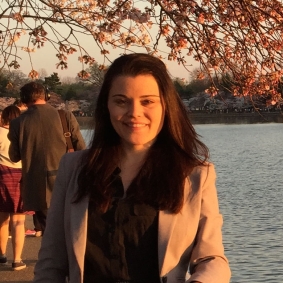Knauss legislative fellowships in Congress help build careers — and they're fun and educational. See our video and fact sheet for details.
Katie Geddes

Fellowship Institution:
NOAA, Office of Oceanic and Atmospheric Research, Office of International AffairsStart Year:
2017Katie Geddes will be working at NOAA’s Office of Oceanic and Atmospheric Research headquarters as an International Affairs Fellow. Katie will work with the Office of International Activities to facilitate international collaboration and partnerships throughout NOAA and its national and international counterparts to advance oceanic, atmospheric, and climate observations research around the world.
Katie received a master’s in Environmental Anthropology from the University of Maryland, College Park where she studied stakeholder engagement and community-based management strategies. She is particularly interested in the socio-cultural lens through which communities view marine management and climate resilience.
As an undergraduate, Katie studied biology at the Georgia Institute of Technology where she conducted offshore research in biological oceanography in the Gulf of Mexico after the Deepwater Horizon oil spill. She hopes to use her dual background in the biological and social sciences to inform and implement effective and mutually beneficial foreign policies through this fellowship.
Katie grew up in Solomons, Maryland but has lived up and down the East Coast. She studied abroad in France and Indonesia and is passionate about helping those disproportionally affected by climate change. She found her interest in policy as an intern at the White House Council on Environmental Quality and subsequently a field organizer for Hillary for America.
Call for Symposium Presenters and Authors
The Chesapeake Rising: Innovative Law and Policy Solutions for Climate Adaptation in Coastal Communities symposium will explore key legal and policy considerations that affect climate adaptation strategies. It provides a unique opportunity for upper-level law students and early-career lawyers to present and publish their legal scholarship.
Program Announcements
-
-
Maryland Sea Grant has program development funds for start-up efforts, graduate student research, or strategic support for emerging areas of research. Apply here.
News and Blogs
Video Gallery
Sea Grant Film Explores a Diminishing Smithville
Smithville is a community on Maryland’s Eastern Shore, on the edge of the Blackwater National Wildlife Refuge. A century ago, Smithville had more than 100 residents. Today, it has four, in two homes: an elderly couple, and one elderly woman and her son, who cares for her.
Featured Fellow
Featured Research Project
Developing a habitat model for mysids, an important link in Chesapeake Bay food webs
Mysids are important mesozooplankton prey for many species of fish in Chesapeake Bay and are an important link in transferring energy from lower to upper trophic levels. Mysids also serve as biological vectors for benthic-pelagic coupling due to their diel vertical migration and omnivorous prey-switching behavior, which makes mysids important regulators of food web architecture. Despite their central role in coastal food webs, surprisingly little is known about mysid ecology and dynamics in Chesapeake Bay.
The Blue Crab: Callinectes Sapidus
An essential resource for researchers, students, and managers. Get your copy today!


©2025 Maryland Sea Grant. All rights reserved.
5825 University Research Court, Suite 1350 | College Park, MD 20740
Phone: (301) 405-7500 | Fax: (301) 314-5780 | Contact Us



